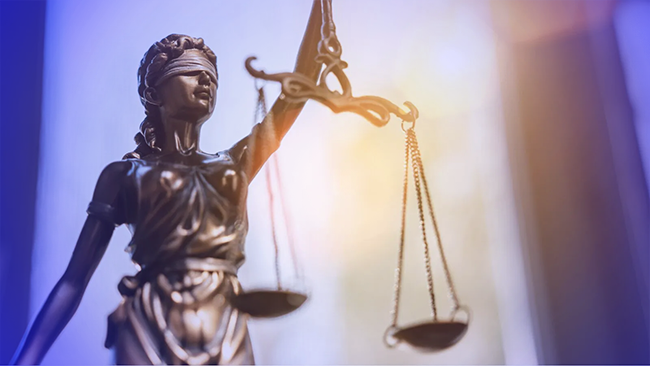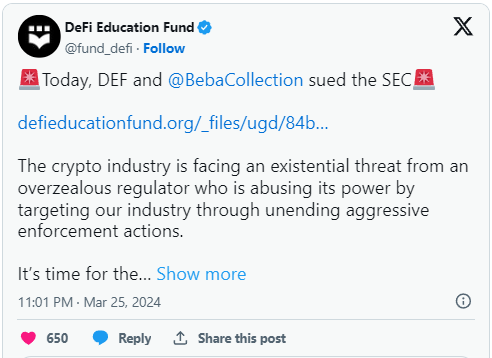DeFi Education Fund Argues in Lawsuit Against SEC Crypto Airdrops Are Not Securities
The DeFi Education Fund claims that airdrops do not involve an investment of money and therefore cannot be considered securities transactions.
Airdrops do not involve capital investment and therefore cannot be considered securities transactions, said the DeFi Education Fund.

The DeFi industry is under increased regulatory scrutiny | Image source: Shutterstock
The crypto industry is taking action and has jointly launched a preventive lawsuit against the U.S. Securities and Exchange Commission (SEC) to fight back against U.S. regulators. This lawsuit highlights the SEC's tough enforcement stance on securities laws.
The DeFi Education Fund filed a lawsuit against the SEC in Texas federal court on Monday, claiming that Texas clothing company Beba’s free airdrop of its BEBA crypto tokens to customers did not violate U.S. securities laws. The lawsuit seeks to have the court rule that Beba’s airdrop is legal and hopefully provide protection for other similar airdrops from SEC prosecution.
The DeFi Education Fund stated in a Texas District Court filing that "Beba has participated in and planned to conduct activities that actually meet the requirements of securities laws, but the SEC has declared them illegal."

Beba did not actually face prosecution by the SEC, but took the initiative to take preemptive measures by citing the Declaratory Judgment Act. Under this law, a party that reasonably believes that it may be subject to unfair enforcement action may seek legal recourse before being harmed.
This aggressive attitude marks a shift in the crypto industry, which in the past has been reactive to the sudden flurry of SEC lawsuits against companies and projects.
Amanda, Chief Legal Officer of DeFi Education Fund "This is really a change of strategy for us," Tuminelli told reporters.
Key to the lawsuit filed by the DeFi Education Fund on Monday is an accusation that the SEC violated the Administrative Procedure Act (APA) by enacting unofficial internal policies regarding cryptocurrencies without public disclosure.
The SEC has maintained that the agency does not need special rules for cryptocurrencies and that the regulator is simply enforcing existing securities laws, saying those laws clearly apply to most cryptocurrency offerings.
"They absolutely have a policy for taking all of these actions, including sending subpoenas and conducting investigations, and because they adopted that policy behind closed doors and refused to write it down, that's a violation of the Executive Order," Tuminelli said. Procedure Act (APA)".
Last month, also in Texas federal court, a group of prominent crypto companies, including Coinbase and Andreessen Horowitz, sued the SEC, claiming the agency had no jurisdiction over much of the crypto industry. The lawsuit marks one of, if not the first, proactive legal actions against federal regulators over their encryption policies.
The SEC has been aggressively pursuing legal action against crypto companies for years. So why are crypto companies now opting for offensive litigation?
"It's not easy to find people willing to sue the SEC," Tuminelli said. "Who's going to say, 'Yes! Let me put myself directly in the SEC's crosshairs and risk them knowing who I am!'"
But at this point, the risks that companies like Beba could face using crypto tokens are so obvious that any tactical advantage may be worth the SEC’s wrath up front.
Historical cases show that the SEC has targeted crypto companies like Beba; in 2018, it sued Tomahawk Exploration LLC for promoting and distributing “TomahawkCoins” even though the company never raised any funds. In 2022, the agency sued Hydrogen Technology Corporation for distributing free “Hydro” tokens for marketing purposes and creating a secondary market.
According to the DeFi Education Fund, such allocations cannot be called securities transactions because they do not involve the investment of counterparty funds, which is a core principle of the SEC’s Howey test, which is used to identify investment contracts.
Free airdrops have taken the crypto space by storm in recent months, raising billions of dollars for companies and projects, although the initial release of tokens to users was free, unlike the legally risky and now outdated first-time airdrops. Coin offerings (ICOs) are done differently.
Brian L. Frye, a law professor at the University of Kentucky, said in a message to reporters that the DeFi Education Fund has presented “strong evidence” that airdrops are not within the jurisdiction of the SEC.
In the past, Frye has criticized crypto companies like Coinbase for underestimating how broad the SEC’s scope is under the Howey test, but he believes the DeFi Education Fund’s claims about airdrops are more reasonable.
In contrast, he believes the fund may have more difficulty trying to prove that the SEC violated the Administrative Procedure Act (APA).
“As the Supreme Court explained in Howey, the SEC does not claim to create new rules for cryptocurrencies, but rather regulates them under its existing authority,” Frye explained. "You don't need notice and comment when you can present your case to the court."
The above is the detailed content of DeFi Education Fund Argues in Lawsuit Against SEC Crypto Airdrops Are Not Securities. For more information, please follow other related articles on the PHP Chinese website!

Hot AI Tools

Undresser.AI Undress
AI-powered app for creating realistic nude photos

AI Clothes Remover
Online AI tool for removing clothes from photos.

Undress AI Tool
Undress images for free

Clothoff.io
AI clothes remover

AI Hentai Generator
Generate AI Hentai for free.

Hot Article

Hot Tools

Notepad++7.3.1
Easy-to-use and free code editor

SublimeText3 Chinese version
Chinese version, very easy to use

Zend Studio 13.0.1
Powerful PHP integrated development environment

Dreamweaver CS6
Visual web development tools

SublimeText3 Mac version
God-level code editing software (SublimeText3)

Hot Topics
 1386
1386
 52
52
 What is Ouyi for? What is Ouyi
Apr 01, 2025 pm 03:18 PM
What is Ouyi for? What is Ouyi
Apr 01, 2025 pm 03:18 PM
OKX is a global digital asset trading platform. Its main functions include: 1. Buying and selling digital assets (spot trading), 2. Trading between digital assets, 3. Providing market conditions and data, 4. Providing diversified trading products (such as derivatives), 5. Providing asset value-added services, 6. Convenient asset management.
 okx Ouyi Exchange web version enter link click to enter
Mar 31, 2025 pm 06:21 PM
okx Ouyi Exchange web version enter link click to enter
Mar 31, 2025 pm 06:21 PM
1. Enter the web version of okx Euyi Exchange ☜☜☜☜☜☜ Click to save 2. Click the link of okx Euyi Exchange app ☜☜☜☜ Click to save 3. After entering the official website, the clear interface provides a login and registration portal. Users can choose to log in to an existing account or register a new account according to their own situation. Whether it is viewing real-time market conditions, conducting transactions, or managing assets, the OKX web version provides a simple and smooth operating experience, suitable for beginners and veterans. Visit OKX official website now for easy experience
 gate.io registration tutorial
Mar 31, 2025 pm 11:09 PM
gate.io registration tutorial
Mar 31, 2025 pm 11:09 PM
This article provides a detailed Gate.io registration tutorial, covering every step from accessing the official website to completing registration, including filling in registration information, verifying, reading user agreements, etc. The article also emphasizes security measures after successful registration, such as setting up secondary verification and completing real-name authentication, and gives tips from beginners to help users safely start their digital asset trading journey.
 ok official portal web version ok exchange official web version login portal
Mar 31, 2025 pm 06:24 PM
ok official portal web version ok exchange official web version login portal
Mar 31, 2025 pm 06:24 PM
This article details how to use the official web version of OK exchange to log in. Users only need to search for "OK Exchange Official Web Version" in their browser, click the login button in the upper right corner after entering the official website, and enter the user name and password to log in. Registered users can easily manage assets, conduct transactions, deposit and withdraw funds, etc. The official website interface is simple and easy to use, and provides complete customer service support to ensure that users have a smooth digital asset trading experience. What are you waiting for? Visit the official website of OK Exchange now to start your digital asset journey!
 Binance binance computer version entrance Binance binance computer version PC official website login entrance
Mar 31, 2025 pm 04:36 PM
Binance binance computer version entrance Binance binance computer version PC official website login entrance
Mar 31, 2025 pm 04:36 PM
This article provides a complete guide to login and registration on Binance PC version. First, we explained in detail the steps for logging in Binance PC version: search for "Binance Official Website" in the browser, click the login button, enter the email and password (enable 2FA to enter the verification code) to log in. Secondly, the article explains the registration process: click the "Register" button, fill in the email address, set a strong password, and verify the email address to complete the registration. Finally, the article also emphasizes account security, reminding users to pay attention to the official domain name, network environment, and regularly updating passwords to ensure account security and better use of various functions provided by Binance PC version, such as viewing market conditions, conducting transactions and managing assets.
 What are the recommended websites for virtual currency app software?
Mar 31, 2025 pm 09:06 PM
What are the recommended websites for virtual currency app software?
Mar 31, 2025 pm 09:06 PM
This article recommends ten well-known virtual currency-related APP recommendation websites, including Binance Academy, OKX Learn, CoinGecko, CryptoSlate, CoinDesk, Investopedia, CoinMarketCap, Huobi University, Coinbase Learn and CryptoCompare. These websites not only provide information such as virtual currency market data, price trend analysis, etc., but also provide rich learning resources, including basic blockchain knowledge, trading strategies, and tutorials and reviews of various trading platform APPs, helping users better understand and make use of them
 Official website entrance of major digital currency trading platforms 2025
Mar 31, 2025 pm 05:33 PM
Official website entrance of major digital currency trading platforms 2025
Mar 31, 2025 pm 05:33 PM
This article recommends ten mainstream cryptocurrency exchanges, including Binance, OKX, Sesame Door (gate.io), Coinbase, Kraken, Bitstamp, Gemini, Bittrex, KuCoin and Bitfinex. These exchanges have their own advantages, such as Binance is known for its largest trading volume and rich currency selection in the world; OKX provides innovative tools such as grid trading and a variety of derivatives; Coinbase focuses on US compliance; Kraken attracts users for its high security and pledge returns; other exchanges have their own characteristics in different aspects such as fiat currency trading, altcoin trading, high-frequency trading tools, etc. Choose an exchange that suits you, and you need to use your own investment experience
 Currency Trading Network Official Website Collection 2025
Mar 31, 2025 pm 03:57 PM
Currency Trading Network Official Website Collection 2025
Mar 31, 2025 pm 03:57 PM
It ranks among the top in the world, supports all categories of transactions such as spot, contracts, and Web3 wallets. It has high security and low handling fees. A comprehensive trading platform with a long history, known for its compliance and high liquidity, supports multilingual services. The industry leader covers currency trading, leverage, options, etc., with strong liquidity and supports BNB deduction fees.



